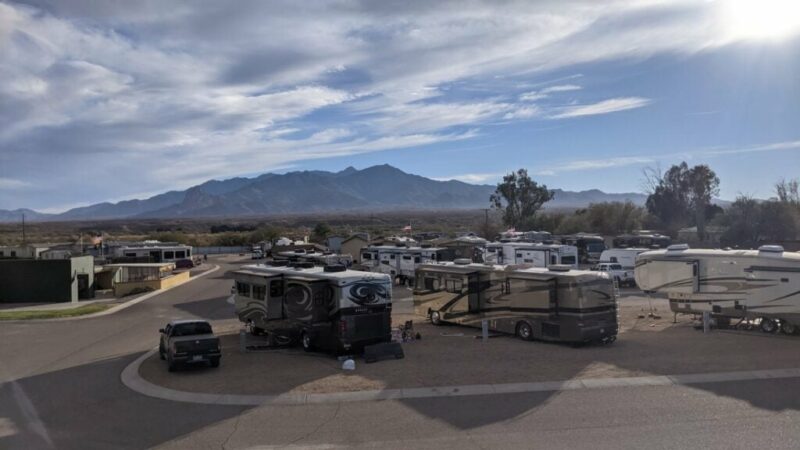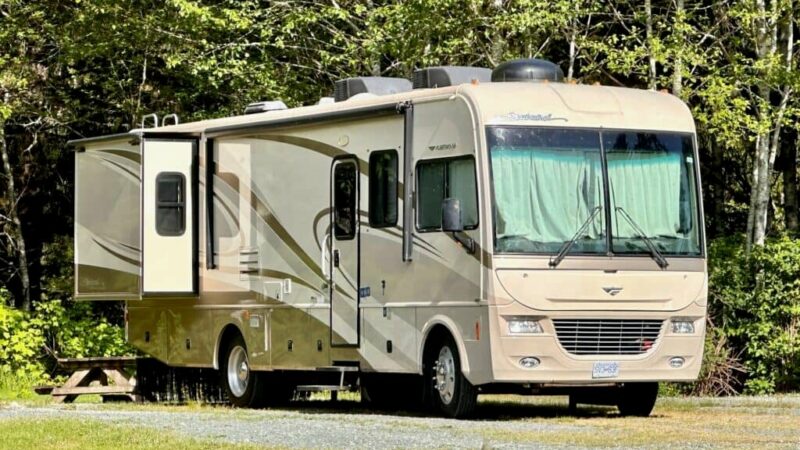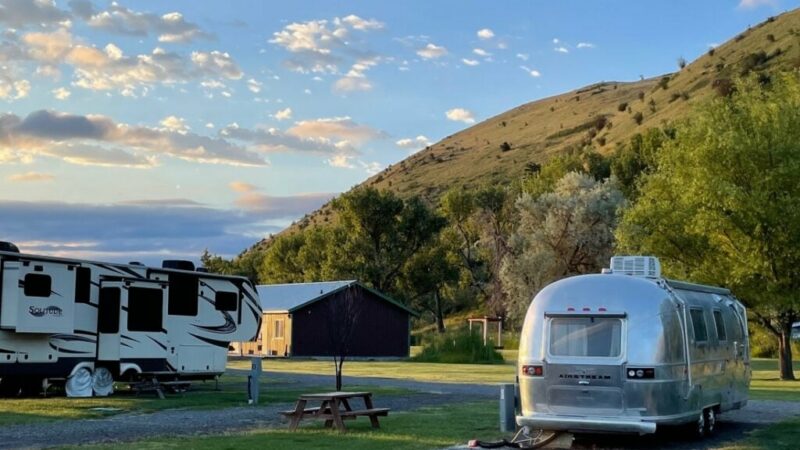RVers Ask: What’s The Best Way To Sell An RV?
Sponsored by National Vehicle
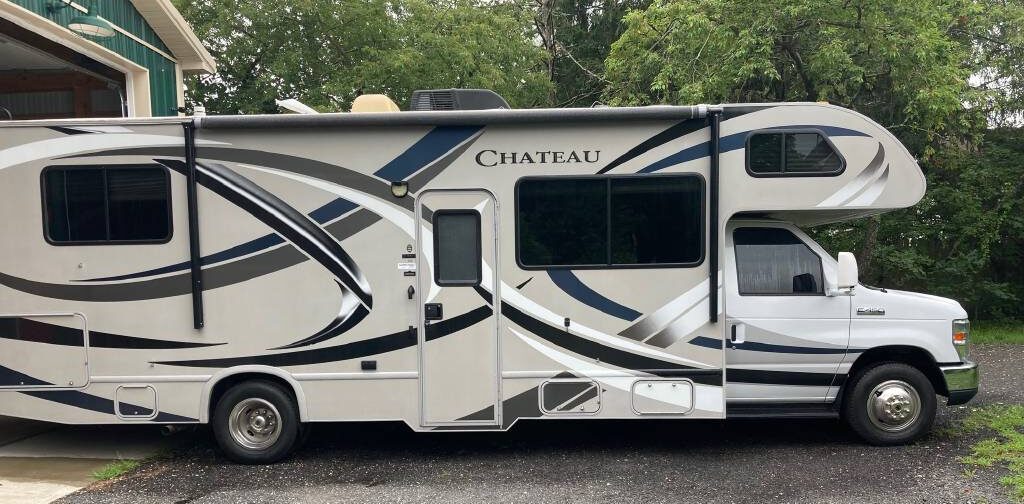
What Is The Best Way To Sell An RV?
Selling an RV can be a big decision. You want to make sure you get the best possible return on your investment.
It is difficult to choose between the different options for selling your recreational vehicle. Whether you are looking to sell a motorhome, campervan, or travel trailer, there are several strategies to consider, each with their own pros and cons.
By considering these options and choosing the best strategy for your specific needs, you can maximize your chances of having a successful and profitable sale.
Know your RV’s value
Stop guessing. Determining what your RV is worth is not as easy as opening a Kelley Blue Book because there are so many different variables that impact the price of used RVs. The brand, model, age, floor plan, amenities, add-ons, and even the region of the country in which it has been used can make a huge difference.
The best way to determine the real-world value of your RV is to get a free valuation. This process simply involves talking with a knowledgeable professional who will ask you all the right questions about your RV. There’s no obligation; just a real person, asking you pertinent questions, so they can develop a comprehensive valuation.
Whether you want to trade-in your RV at a dealership, put it on a consignment lot, or do it alone, you need to know what it’s worth today in the real world.
Ways to sell an RV
There are three ways to sell an RV, with pros and cons associated with each one. You’ll need to evaluate the advantages and disadvantages to decide which route will work best for you.
The three methods are:
- Most expensive: Trade in (or sell it outright) to a dealership.
- Slow and expensive: Sell through a consignment lot.
- Best return: Sell it yourself in the private marketplace and maximize your value!
Your time is precious, so there’s no point in burying the lead. The best option for most RV sellers is to sell your RV in the private marketplace with professional help, where you control the entire process, have full access to your RV throughout the process, and make the most money from the sale.
But you’ll find all the pros and cons for the three strategies below, so you can ultimately decide what will work best for you. Of course, some sellers are going to want to just get the transaction done as quickly as possible and don’t care how much money they may lose. For them, trading it in at a dealership might be the path of least resistance.
Only you know what your objectives are, but remember this whole process starts by determining what your RV is really worth.
Pros and cons of trading in an RV
Trading in your RV to a dealer can be a fast and convenient option for those looking to upgrade to a newer model or simply want to get rid of their current RV. However, it is important to understand the advantages and disadvantages of trading your RV to a dealership before deciding.
Although selling to a dealer may be the easiest and fastest way to sell an RV, it’s probably not your best option. If there was ever a time to know what your RV is truly worth, it’s during the process of negotiating with a dealer.
The dealership may try to focus all your attention on the new RV, so the real value for your current RV slips out of mind, but the difference between its actual value and the dealer’s offer could leave a balance due on your current RV, which gets rolled into the cost of your new RV.
Pros of selling an RV (or trading in an RV) at a dealership
- Convenience – It’s a straightforward transaction that results in quick sale.
- Simplified process – Dealers will accept your RV “as-is”, so no repairs will be needed.
- Hassle-free – There’s no need to meet or negotiate with buyers.
Cons of selling an RV (or trading in an RV) at a dealership
- Reduced profit – Typically, offers range 15-20% below low retail (resulting in thousands of dollars lost).
- Pressure to buy – You are likely to face pressure to buy another RV while they have you at the dealership.
- Limited negotiation power – Dealers won’t wiggle much on their trade offers.
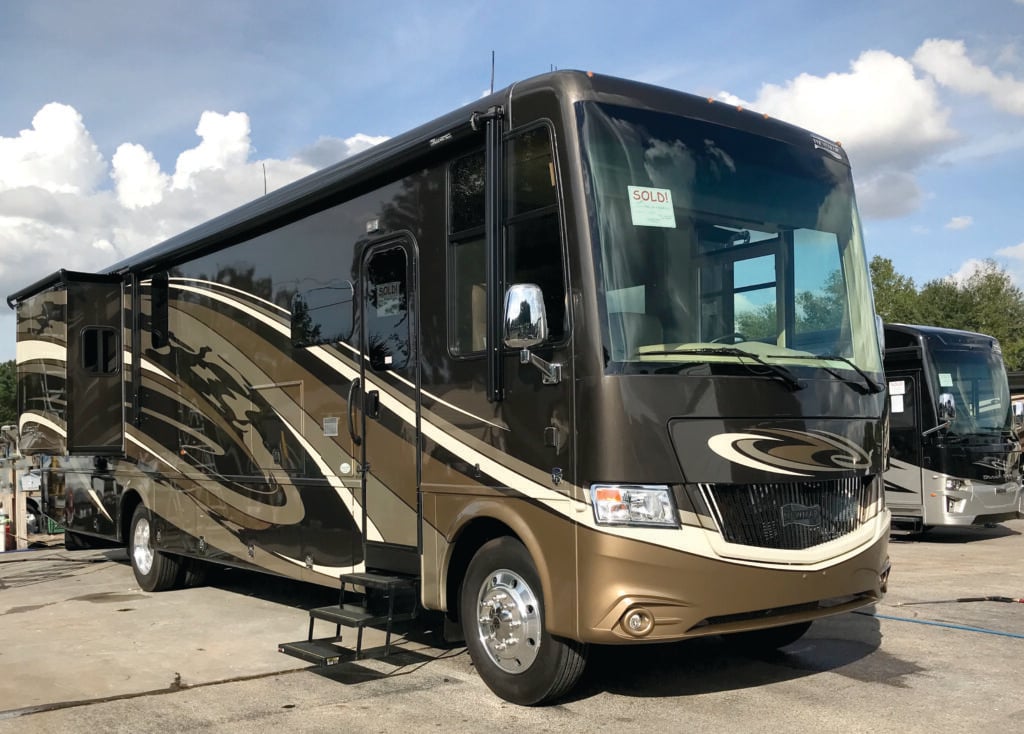
Pros and cons of RV consignment
Another strategy for selling your RV is to place it on a consignment lot. There are different levels of service available, so take your time and make sure the lot you choose has a good location, excellent security, and a knowledgeable and engaging staff.
Your RV will be on this lot for as long as your contract specifies, so make sure you are satisfied with the security features, hours of operation, the lot’s advertising policies, and their knowledge of your specific RV.
Pros of selling through a consignment lot
- Convenience – Consignment lot personnel meet the buyers and negotiate the sale.
- No hassle – Consignment lot sales are hands-free for the RV owner.
Cons of selling through a consignment lot
- Broker fees – This is typically 10% of the sales price (thousands of dollars lost in commissions).
- Timing – It takes longer than selling to a dealership.
- Binding contract – This includes loss of control for the duration of the contract, and you cannot use your RV.
- Loss of value – Consignment lots have little motivation to negotiate the best price.
Pros and cons of selling an RV privately
Once you know what your RV is worth, you need to decide if you want to sell it “as-is” or enhance its value by putting a little extra effort into preparing it for sale.
Most RVs represent a significant financial investment. When you’re ready to sell your RV, you’ll want to realize the maximum value from your sale, and selling it privately allows you to do just that.
However, there are a few things you can do to make sure that the asking price aligns with the valuation. For example, if there are minor repairs needed, or your RV would benefit from a thorough cleaning inside and out, making those minor changes will increase its value (even if you decide to trade it in at a dealership).
When you’re selling it in the private marketplace, these minor improvements will be even more advantageous because private buyers want to see that you have taken good care of the RV. Additionally, when you sell it privately, you maintain control over your RV and you still have complete use of your vehicle until it’s sold.
Pros of selling an RV privately
- You receive the maximum value from the sale.
- Dealers pay roughly 20% less than the lowest valuation
- Consignment lots generally charge 10% of the sale’s price
- You know your RV better than anyone, and you are the best person to sell it.
- You control the entire process.
- You have access to your RV until it’s sold.
The good news is that if you do decide to sell your RV privately, you do have options. You can still control your selling journey, maximize your profit, use your RV while it’s for sale, and access help from professionals that can guide you throughout the entire process. Rest assured; you do not have to do any of this alone.
For a one-time nominal fee, National Vehicle will assist you with your private sale, in the following ways.
- They provide a free valuation.
- They communicate with you and provide a series of free step-by-step instructions in ways to prepare your RV for sale to maximize your return.
- They create compelling ads for your RV.
- They place the ads in all the publications where RV shoppers look for used RVs.
- They remain involved in the process until your RV is sold.
- They assist buyers in obtaining competitive financing, when needed.
- They assist buyers by arranging an independent RV inspection, if needed.
- They are the #1 resource in the for-sale-by-owner RV private marketplace.
Cons of selling an RV privately
- It may take longer to sell it privately, but it is more profitable than trading in your RV.
- You do ALL the work.
Sell your RV with National Vehicle
After comparing these three strategies for selling your RV, you have, no doubt, decided on the best method to meet your specific needs.
If you’re in a hurry and you’re not worried about the money, then selling it to a dealership may be your best option. However, even if that’s what you want to do, you should still be armed with a current RV valuation so you can negotiate with the dealer from a position of strength.
On the other hand, if you truly want the best price for your RV, then you need to contact National Vehicle to get the free valuation process started; then you can talk to them about all the tools and assistance they offer to help you cash in on the most lucrative place to sell your RV, the private “for-sale-by-owner” marketplace. With National Vehicle’s help, you can navigate this marketplace like a pro and sell your RV at its highest value.
How do we know? Because, every year, National Vehicle helps thousands of “for-sale-by-owners RVers, just like you, sell their RVs to private buyers.
Learn more:
The post RVers Ask: What’s The Best Way To Sell An RV? appeared first on RV LIFE.
Source: https://rvlife.com/rvers-ask-whats-the-best-way-to-sell-an-rv/





